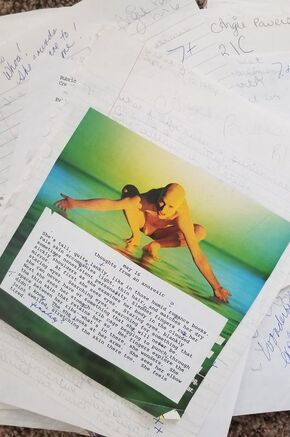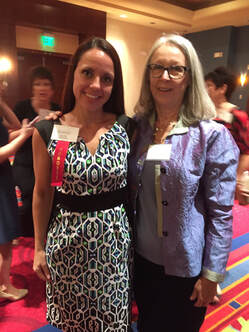|
By Angie Powers  Examples of Mrs. Bushman's "plus" feedback. Examples of Mrs. Bushman's "plus" feedback. My grandmother was hard and sturdy. She taught me that being a woman, a human even, meant “sucking it up.” Life doesn’t care so much about your feelings; it will simply go on. She knew, with great certainty, that her job was to raise me as a strong woman. Enter Kay Bushman Haas. I knew, without really knowing, that Mrs. Bushman was a great teacher within moments of walking into her class as an introverted freshman. I didn’t know the accolades she had earned; I just knew that teaching came out of her pores. She effused her passion for language at the beginning of every class with our Daily Oral Language work--not something she mindlessly pulled from a book, oh no! She crafted our language workouts from student writing. She made nouns and verbs and adjectives and adverbs titalating. She invited us into Verona, Italy; Tuscumbia, Alabama; and even London, Oceania. I immersed myself in their pages, emerging after the last somehow expanded. I walked into her classroom knowing I wanted to be a teacher; I walked out knowing I wanted to be an English/Language Arts teacher like her. Lucky for me, Mrs. Bushman taught me again in Creative Writing sophomore year. I had been hoarding poems for years, so this was a class I desperately wanted to take. But, like most budding writers, I was terrified of sharing my writing. There was no way I was going to take that risk... well, until I learned she was the teacher. She taught me that my writing doesn’t have to be “good” or “bad,” but that writing is about those moments. Those punch-you-in-the-gut, jump-off-the-page moments. They can be fleeting, even buried. She shared those moments out of our writing anonymously in front of the class, finding the pearls in the mollusks of teenage angst, lonely sci-fi, and saccharine romance. I would sit--really perch--on the edge of my plastic seat, waiting to see if one of my moments would come out of her mouth. Sometimes, they did; sometimes, they didn’t. But that didn’t really matter because once she handed me my pages, they would be cluttered with plus signs, signifying that she saw every moment I offered. I would spend hours re-reading every moment she marked, trying to figure out what made that moment--or even me--worthy. I knew Mrs. Bushman was a strong woman. She was like my grandmother in that sense. They both weren’t tongue-holders; some might have even called them pushy, or worse. They both walked with a confidence that lacked arrogance to the discerning eye. So imagine my surprise when Mrs. Bushman smashed my grandmother’s definition of strength before my very eyes.  Kay and Angie at the Kansas Teacher of the Year banquet. Kay and Angie at the Kansas Teacher of the Year banquet. We spent a lot of time in Creative Writing journaling. I looked forward to the quiet time to write, finding asylum from the din of adolescence in the silence. I can’t remember if Mrs. Bushman shared her poem after one of our daily journaling sessions--or if it was something she shared at another time--but I remember her sharing. The poem was about loss. As she read, I constructed plus signs in my head for each of her moments. I was in awe that she shared so fiercely, reading her own words in front of a group of people--albeit a motley crew of drama-prone teens. And then it happened. Her voice cracked. I looked around, uncomfortable to stare directly at raw emotion. She wiped tears from her face. And then we continued class. Nobody knew that she had just incinerated my idea of strength. Over 25 years later, the yin and yang of strength and vulnerability still give me pause. I am more practiced at my grandmother’s strength: it carried me through long days as a teen mom and long nights of studying. It helped me through my first year of teaching while pregnant, strangely enough in the same teaching position that Mrs. Bushman left the year before. That kind of strength was about risk aversion: put your nose down, work hard, and never EVER let them see you sweat. But the vulnerable strength of Mrs. Bushman is the polar opposite of my grandmother’s and all about risk-taking. Like writing this. Those of us teaching today have the same power as Mrs. Bushman, who I now call my dear friend, Kay. Whether we teach from a classroom or a cart or our own homes, our lessons may begin with standards but they don’t end there. Our students learn a lot from us--not only from what we say but what we choose to not say. Kay had the strength to show her vulnerability. She took a risk, not knowing the impact on me--or my classmates. Her tears revealed her hurt; the crack of her voice told me that she knew she was going to be okay. Isn’t that what our students need to know right now? We all may hurt in different ways, but we can be okay. Social-emotional learning and resilience are hot topics in education, but master teachers of the past have grappled with them for centuries. Today, our challenge is to meet students’ needs in these areas during a time of uncertainty and amplified inequity. The weight of this challenge, no doubt, will require both my grandmother’s and Mrs. Bushman’s strengths. I’m putting my nose down, embracing my grandmother’s grit, by studying what it means to be an “emotion scientist” with Permission to Feel by Marc Brackett, Ph.D. However, I’m also living the truth of vulnerability. I can’t count the number of times I’ve felt the annoying sting of tears in my eyes for all of the things I’m missing at the end of my tumultuous twentieth year of teaching: my students, my colleagues, my family. Sometimes I’m angry. I’m furious that some of my students are ashamed of being who they are because of the anti-Asian sentiment COVID-19, and some of our nation’s leaders, have stoked. I resent the fact that some of my students need food, internet, or even a hug, and I cannot provide them all. But instead of feeling all of these things alone in my house, I choose to share them--even though you can’t hear the crack in my voice. I choose to share them because of a teacher--now friend--named Kay. And I know that, in the end, we can be okay.  About the Author Angie Powers is the mother of two strong humans. She's finishing her 20th year of teaching from her kitchen table in Olathe, KS. Her passion for advocacy has provided her many professional opportunities: NEA Board of Directors, Welcoming Schools facilitator, 2018 KTOY Team, Greater Kansas City Writing Project Fellowship, and National Board Certification. You can follow her on Twitter at @angsuperpowers
Deborah
5/7/2020 02:35:36 pm
Thank you for sharing these beautiful memories. So many times the real lessons come from those quiet moment, not from power points and quizzes. You are a legacy as much as you are leaving one. Comments are closed.
|
Message from the EditorWelcome! We're glad you are here! Archives
April 2024
Categories
All
|
 RSS Feed
RSS Feed